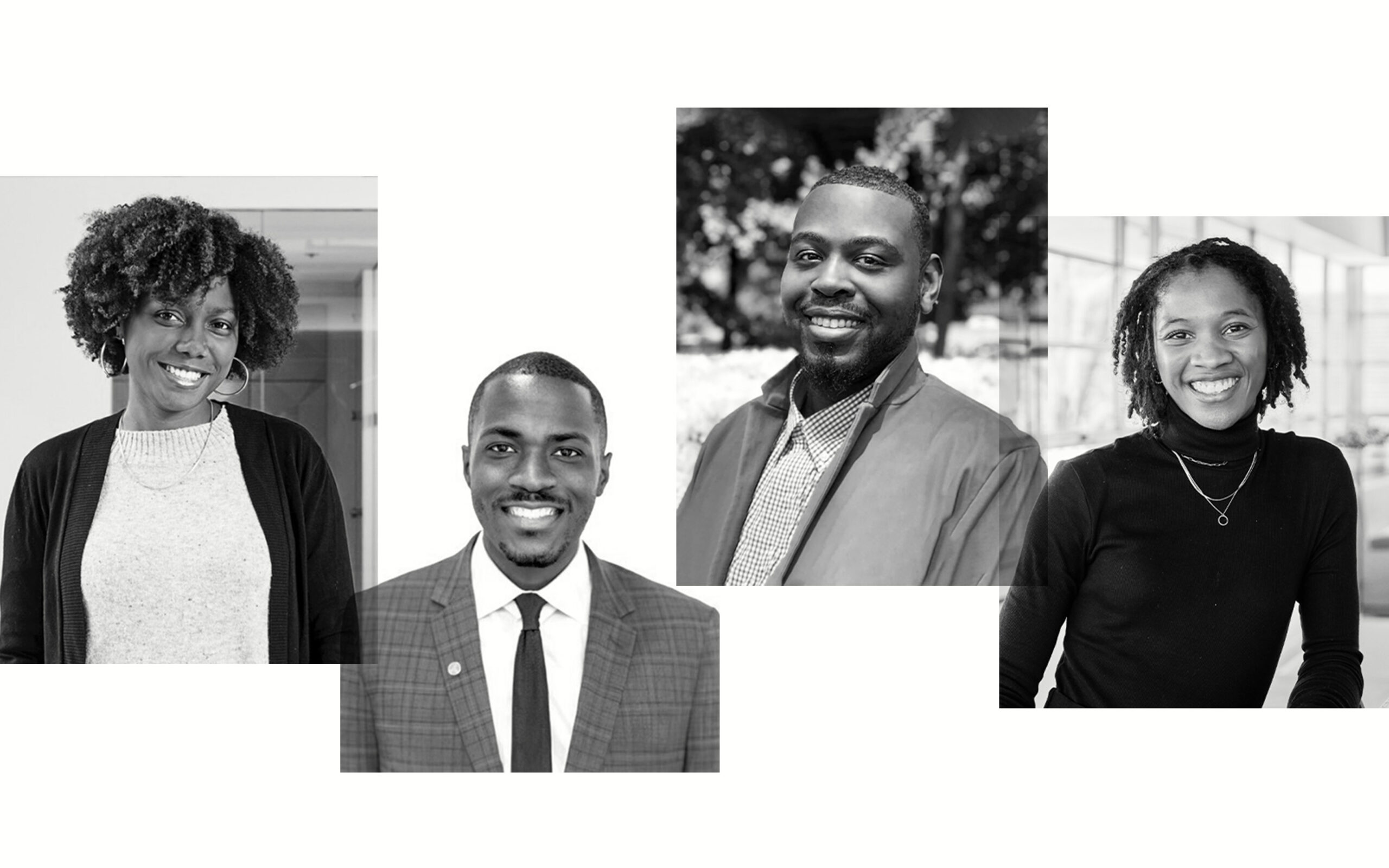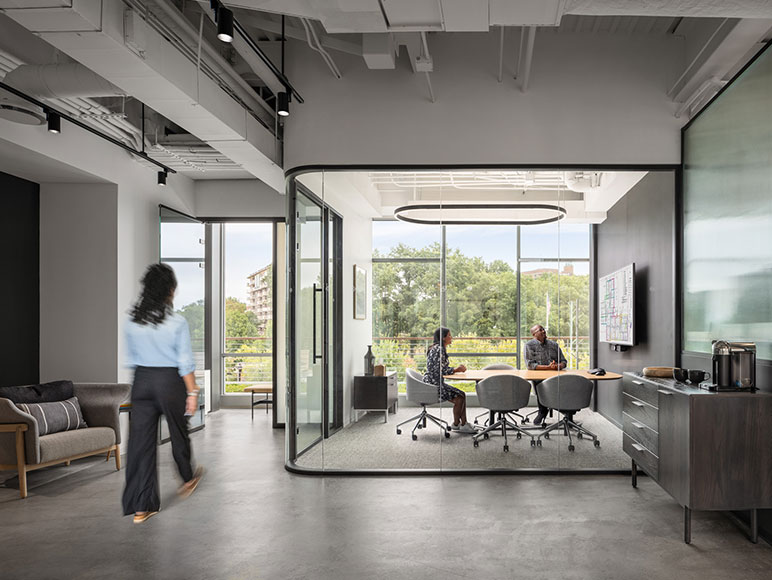The confluence of diverse backgrounds in the workplace sparks creativity, drives innovation, and empowers us all to rise above assumptions and stereotypes.
newsstand
Announcing the Recipients of OTJ’s Licensure Scholarship for Black and African American Architects and Interior Designers
We are pleased to introduce the recipients of the OTJ Licensure Scholarship for Black and African American Architects and Interior Designers. This scholarship will provide funds and supporting materials for the pursuit of licensure in the architecture and interior design industry.
OTJ believes that the future of our industry must be defined by measurable, time-bound action toward greater diversity, equity, inclusion, and access. The confluence of diverse backgrounds in the workplace sparks creativity, drives innovation, and empowers us all to rise above assumptions and stereotypes.
Black and African American professionals, however, face unique challenges on this path. Statistics are sobering: Black and African Americans make up only 1.8% of the NCARB licensed certificate holders and less than 1% of NCIDQ licensed certificate holders. It is also recorded that Black and African American candidates spend more on test-taking and study materials on average.
Achieving licensure in the fields represents the culmination of an educational journey unique to our profession. Licensure is also a vital avenue in the development of the next generation of design talent.
Recipients will receive the following:
Architectural
- The annual cost for the 6 NCARB (ARE) divisions within one given year
- Access to the online study guide Amber Book
- PPI exam prep materials for the ARE examination
Interior Design
- The one-time cost for the 3 sections of the NCIDQ exam
- Access to the study guide Q-Practice
- PPI exam prep materials for the NCIDQ examination

Architectural Scholarship Recipients
Deshona Nelson
Driven by her interest in the intersection of architecture and health, Deshona is currently a designer at EwingCole. She previously worked for Page and SK+I Architecture. Deshona received her Master and Bachelor of Architecture from the Savannah College of Art and Design.
“I started my career in DC in 2013 and came across multiple challenges within the profession. I realized there was a huge gap in transitioning from the academic world to the workforce, which I have learned to adapt to. Since working at EwingCole, I have completed two out of six exams towards licensure. Studying for these exams has been the hardest thing I’ve ever pursued. Managing my career development and balancing work-life while studying became very hard. There were moments when I felt that I was missing pieces of information, or that I needed better resources to help understand the content to pass these exams. Now, with more available resources, I feel like I can sail through any rough waters that come my way.”
Reuben Cheeks, NOMA, WELL AP
Reuben is an active member of his community who has participated in the BostonNOMA Project Pipeline and in the Design Discovery program at Harvard University. Reuben has also volunteered at a Hip-Hop Architecture camp. He has a Master of Architecture from Prairie View A&M University and currently works as a designer at IDG+ Architecture.
“Becoming a recipient of this scholarship means the world to me, especially given the significant lack of African American representation in the architecture field. This scholarship isn’t just financial assistance; it’s a game-changer in my journey to becoming an architect. It’s the support and resources I need to navigate the challenging path to licensure. With this scholarship, I’m not just aiming to beat the odds; I’m determined to bring fresh perspectives and pave the way for more diversity and inclusion in architecture. It’s about defying statistics and making a tangible difference in a profession that sorely needs it. This opportunity fuels my passion and dedication, driving me to not only achieve my own goals but also to inspire and uplift others from underrepresented communities who dream of pursuing architecture.”
Interior Design Scholarship Recipients
Eric Harris, Assoc. AIA, NOMA, SSAC
Eric is currently an Adjunct Professor for the Department of Architecture & Urban Sustainability at the University of the District of Columbia and previously worked for Studio Lyew and Samaha Associates. Eric is pursuing a Doctorate in Urban Leadership and Entrepreneurship and recently received the CAUSES (College of Agriculture, Urban Sustainability, and Environmental Sciences) Aspiration Award for Architecture and Urban Sustainability.
“This scholarship will allow me to promote excellence in interior architectural education, training, and practice; to foster an appreciation of interiors and related disciplines; to enrich communities in a spirit of collaboration; and to organize students/ emerging professionals and combine their efforts to advance the art and science of architecture. I want to contribute to the profession as a licensed interior designer by designing inclusive spaces that enhance project-based learning, content delivery (andragogy and heutagogy), and connecting theory to practice. These efforts increase my potential to become a better person, a better learner, a better leader, and ultimately, a better interior designer through certification.”
Montoya Coleman
A designer at Gensler and previously with Corgan, Montoya received a Bachelor of Science in Interior Design from the CIDA-accredited interior design program at Kansas State University. Montoya has also studied Gerontology and is especially interested in the concept of “aging in place” as well as the application of universal design principles to all projects.
“Certification would be a life-changing achievement for myself, my son, and my future as an interior designer within a firm and as an aspiring entrepreneur. Certification validates my knowledge, experience, and skill sets, which would be recognized by my employer and fosters an opportunity to explore entrepreneurship through industry-wide visibility and recognition. I would be able to provide professional advice and services backed by my knowledge, expertise, and qualifications as a certified interior designer. As a single black mother, increasing my annual income would allow me to achieve more personal goals, such as buying a home, paying off debt, investing in my own business, and providing my son an education to advance his growth potential.”



